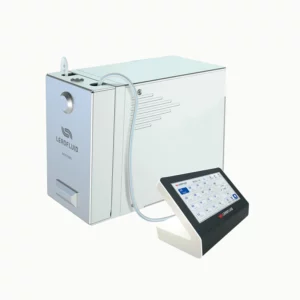In the field of fluid handling and precise liquid dispensing, laboratory syringe pumps, microfluidic peristaltic pumps, and micro dosing pumps have emerged as innovative solutions. These pumps offer accurate and controlled fluid delivery, making them indispensable tools in various scientific and industrial applications. This article explores the features, advantages, and applications of these three pump technologies.

Laboratory Syringe Pump: High Precision and Programmable Fluid Delivery
Laboratory syringe pumps are versatile instruments used for precise and controlled liquid dispensing in laboratory settings. They consist of a syringe holder and a motor-driven mechanism that pushes the plunger of the syringe to deliver fluids at a desired flow rate. These pumps offer high accuracy and repeatability, making them ideal for applications requiring precise dosing and continuous flow. Laboratory syringe pumps find applications in areas such as chemical synthesis, drug discovery, microfluidics, and biotechnology research.
Key Features and Advantages:
- Precise and accurate fluid delivery with adjustable flow rates.
- Programmable control for automated experiments and complex dosing protocols.
- Compatibility with a wide range of syringe sizes for flexibility in experimental setups.
- Integration with computer systems for data logging and remote control. User-friendly interfaces and intuitive software for easy operation.
Microfluidic Peristaltic Pump: Gentle and Versatile Fluid Handling in Microscale Systems
Microfluidic peristaltic pumps are specifically designed for handling small volumes of fluids in microfluidic systems. These pumps utilize a tubing with rollers that compress and release the tubing to create a peristaltic motion, propelling the fluid through the system. The gentle pumping action of peristaltic pumps minimizes sample contamination and damage to sensitive biological samples. Microfluidic peristaltic pumps are widely used in applications such as cell culture, organ-on-a-chip systems, and lab-on-a-chip devices.
Key Features and Advantages:
- Precise and gentle fluid handling suitable for delicate samples.
- Excellent compatibility with microfluidic systems, enabling integration with complex setups.
- Low dead volume, reducing sample waste and enabling efficient mixing.
- Easy tubing replacement for quick setup changes and prevention of cross-contamination.
- Compact and portable design for space-constrained laboratory environments.
Applications of Microfluidic Peristaltic Pumps
- Biomedical Research: In cell culture studies and organ-on-a-chip models, microperistaltic pumps provide controlled delivery of nutrients, drugs, or growth factors to cells with high temporal and spatial resolution. This capability is critical for simulating physiological conditions and understanding cellular responses.
- Pharmaceutical Development: These pumps play a pivotal role in drug discovery processes by enabling accurate dosing and mixing of reagents in assays. Additionally, they contribute to the development of personalized medicine through precise dispensing in micro-total analysis systems (μTAS) and lab-on-a-chip devices.
- Diagnostic Devices: Microfluidic peristaltic pumps are integrated into point-of-care diagnostic kits and portable medical devices for sample preparation, reagent delivery, and assay readouts. Their ability to handle small volumes ensures minimal waste and rapid results.
- Chemical Synthesis: For synthesis of chemicals and biomolecules, microperistaltic pumps offer reproducible reactions at a reduced scale, allowing for efficient use of expensive reagents and enhanced process control.
- Environmental Monitoring: They are also employed in environmental testing equipment for sampling and metering of trace contaminants, ensuring consistent and accurate measurements.
Micro Dosing Pump: Exceptional Precision and Control for Accurate Fluid Metering
Micro dosing pumps are designed to deliver extremely small volumes of liquids with high precision. These pumps are commonly used in applications that require accurate dosing, such as pharmaceutical research, chemical analysis, and additive manufacturing. Micro dosing pumps often utilize advanced technologies, such as piezoelectric or electromagnetic actuation, to achieve precise and controlled fluid delivery.
Key Features and Advantages:
- Ultra-precise dosing capabilities, enabling accurate dispensing of small volumes.
- High repeatability and accuracy for consistent results.
- Compact and lightweight design, suitable for integration into automated systems.
- Programmable control for customized dosing profiles and multi-step protocols.
- Compatibility with a wide range of fluids, including corrosive and viscous substances.
Laboratory syringe pumps, microfluidic peristaltic pumps, and micro dosing pumps have revolutionized fluid handling and precise liquid dispensing in various scientific and industrial applications. These pumps offer exceptional accuracy, control, and versatility, enabling researchers to perform complex experiments and achieve reliable results. As advancements continue in pump technologies, these tools will undoubtedly play a pivotal role in advancing scientific research, pharmaceutical development, and other fields that require precise fluid control.